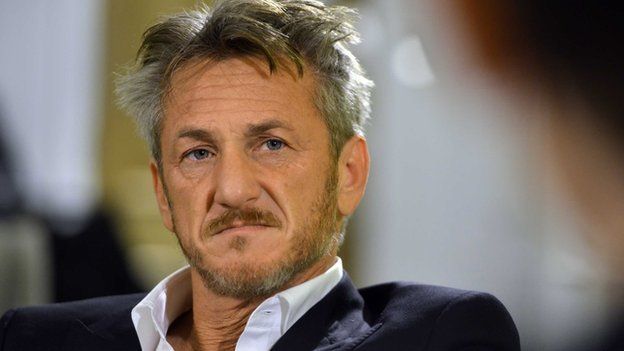Did Sean Penn break the law with El Chapo interview?
- Published

Did Sean Penn break the law when he did an interview with Joaquín "El Chapo" Guzman for Rolling Stone?
Guzman, the head of the Sinaloa drugs cartel, was captured on Friday after escaping from a prison in Mexico last year, the second such breakout he's managed to pull off.
Guzman had been charged with drug trafficking and murder. US prosecutors have said he's helped to bring more than 500 tons of cocaine into the US over the last several decades.
He has operated a vast drug empire that has a fleet of trucks, aeroplanes and submarines, as he told Penn in the interview, conducted while Guzman was still in hiding.
Actor Penn has been secretive about the circumstances around the interview, which was conducted while Guzman was being pursued by Mexican and American authorities, and how he managed to secure it in the first place. He says he was put in touch with the drug lord through the Mexican actress Kate del Castillo, who was in talks with Guzman about a biopic.
In his Rolling Stone piece, Mr Penn talked about the use of burner phones and other methods used to escape detection by authorities.
Many people have wondered whether Mr Penn broke the law with his reporting - and whether or not he could be prosecuted.
But legally, it is OK to talk to someone when they are a fugitive from justice?
"Simply having contact with a known narco-trafficker is not the basis of prosecution," said Daniel Richman, a professor of law at Columbia University and a former federal prosecutor.
But if Mr Penn had helped Guzman in some way to avoid capture - or interfered with the authorities' efforts to find him - he could be prosecuted.
There don't seem to be signs that Mr Penn is guilty of that, or that authorities in the US or Mexico will file criminal charges against him.
In the past, authorities have decided not to go after journalists or former officials who have interviewed notorious figures.
Osama Bin Laden spoke to journalist Robert Fisk for a series of interviews, and to former US justice department official John Miller in 1998 for an ABC News report.
Neither Mr Fisk nor Mr Miller was prosecuted. A senior intelligence official told the BBC that in a similar way it's unlikely that Mr Penn will be.
Yet his interview has made people uncomfortable, especially given Guzman's history of violence.
"It may be immoral," said Stanford Law School's Robert Weisberg, describing Penn's journalistic work. "But it's not illegal."
Caleb Mason, a former federal prosecutor who used to work on drug-smuggling cases, said Mr Penn was unlikely to be prosecuted in Mexico, either. "He was just doing an interview," said Mason. "Mexican law is pretty protective of journalistic rights."
Still, Mexican authorities have made it clear they would like to talk to Mr Penn - though they haven't said anything publicly about prosecuting him.
As Cesar Diaz, a former senior special agent who worked on investigations of Pablo Escobar, a Colombian drug trafficker, said: "If I was a Mexican authority, I would want to know: How in the heck did Sean Penn know where El Chapo was and we didn't?"
- Published10 January 2016
- Published11 January 2016
- Published11 January 2016
- Published17 July 2019
- Published10 January 2016